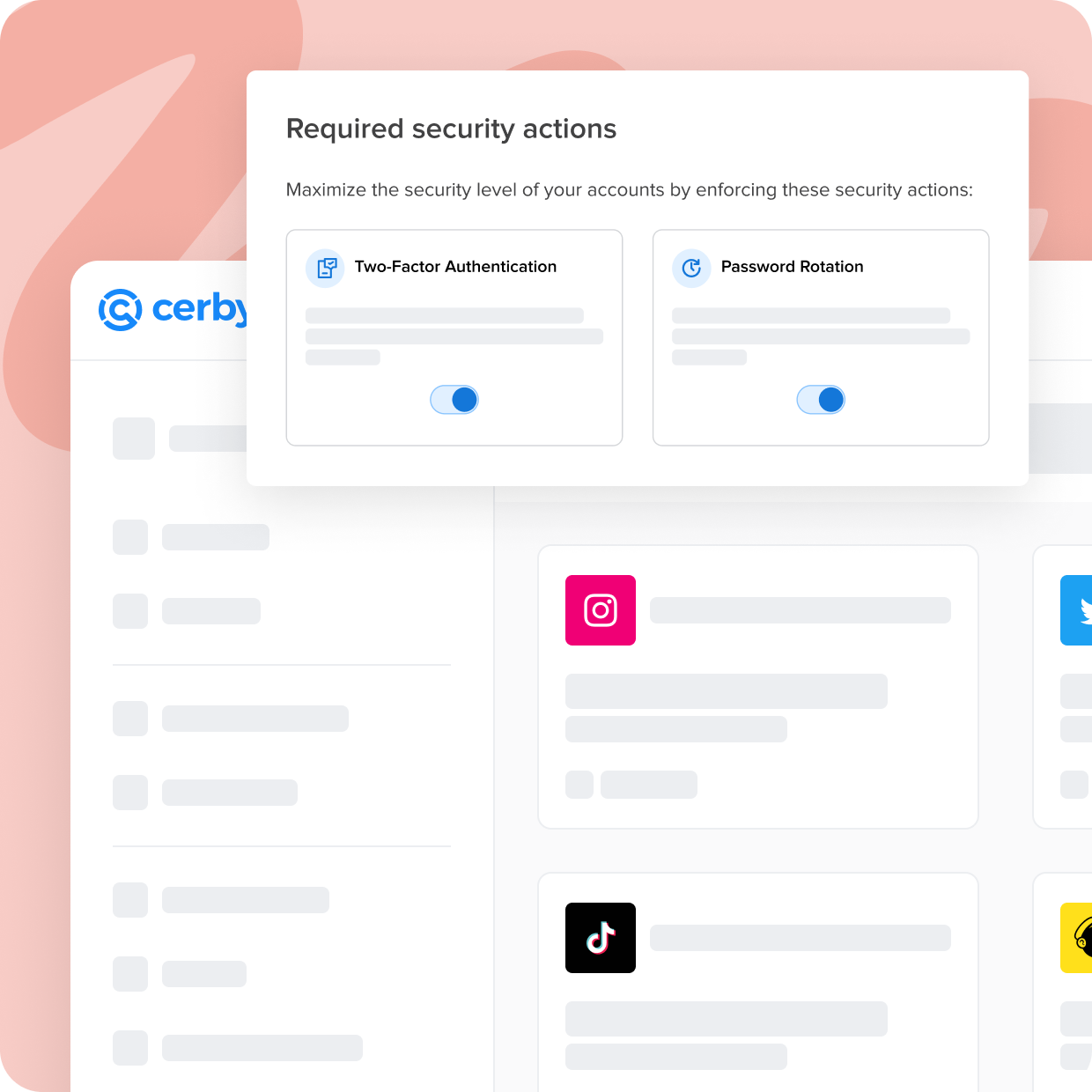Social media has become a go-to platform for communication and connection unfortunately, many corporate applications don't support shared accounts. However, social media platforms are all nonfederated applications that are not supported by SSO standards. Applications that fall into this category are best called "unmanageable." Unmanageable applications are a new category that is becoming increasingly challenging for businesses to manage and secure effectively, yet increasingly critical for businesses to succeed.
Cerby allows you to securely share access to any application, even if it's not supported by your IT team. In this guide, you'll learn the best way to share passwords, the challenges, and the players.
Streamline Access With Single Sign-On
Not all apps are created equal. Some come with security gaps and complexities that can hinder user adoption and put sensitive data at risk. With Cerby, you can ensure secure and seamless access to all your applications, regardless of their support for standards like SSO.
With Cerby You Can

Get your team connected securely

Share logins without sharing passwords

Secure 3rd party access
Social Media Security Risks
Social media has become a go-to platform for communication and connection. However, with the increasing use of social media comes rising concerns regarding social media security risks. Social media security can be extremely important–but what is social media security?
Social media security involves strategies and practices put in place to protect social media accounts and data from malicious attacks by cybercriminals. Social media security risks can be a huge concern for both individuals and businesses.
Social media attacks examples can range from identity theft, cyberbullying, and phishing scams to cyberstalking, account takeovers, and malware infections. Cybercriminals can use social media to gather personal information that can then be exploited. Though social media attacks can happen to individuals or organizations, businesses face unique challenges regarding social media security risks.
The top five risks companies face when using social media include:
- Data breaches
- Reputational damage
- Cyberattacks
- Intellectual property theft
- Employee misuse of social media.
These risks are not limited to large corporations but can also affect small businesses and startups that rely heavily on social media to promote their brand.
Data breaches represent a serious potential threat to businesses. Social media platforms can even sometimes provide indirect access to vital information such as customer data, financial data, and business strategies. A data breach can lead to financial loss, reputational damage, and loss of customer trust.
Reputational damage can occur, for example, should a business's social media account become compromised, which could open the business up to online trolling or inappropriate posting. Cyberattacks can be started on businesses via social media, resulting in financial loss and disruption of operations.
Intellectual property theft is another social media security risk that can happen indirectly. Should corporate social media accounts become compromised? Cybercriminals could steal a business's intellectual property, such as trademarks, patents, and copyrights.
Employee misuse of social media is also a significant social media security concern. Employees can unknowingly or accidentally expose business-sensitive information on social media, leading to security breaches.
Social media security is important for both individuals and businesses. Business owners should take the necessary precautions to minimize social media security risks. Such precautions might, for example, include implementing strict access control policies, employee training on social media policies, regularly monitoring social media accounts, and engaging security experts to review social media security.
Individuals should also be extra cautious when using social media platforms. It can be helpful to be familiar with associated risks and take adequate measures to reduce exposure to social media security risks. Such measures might include using strong passwords, avoiding oversharing personal information, being cautious of unsolicited messages, and regularly monitoring social media accounts.
Social media is a powerful tool that has changed how we communicate and connect. However, it has also opened the door to social media security risks. We’ve explored some of the various social media security risks and examples, including the top five risks companies face when using social media.
To mitigate these risks, businesses and individuals should take necessary precautions such as implementing access control policies, employee training, practicing good cyber-hygiene, and hiring security experts. By doing so, we can strive to enjoy the benefits of social media while protecting ourselves from social media security risks.
Privacy And Security In Social Media
Social media has changed the way we communicate with each other, but it’s also opened doors to various social media risks. Privacy and security in social media have become a growing concern for individuals and businesses. Social media usage can be risky, exposing users to potentially harmful situations, such as privacy invasion, harassment, and threats.
Privacy invasion is one of the most significant social media risks. Social media platforms collect vast amounts of data on users, which can be misused if it falls into the wrong hands. Privacy invasion can lead to identity theft, stalking, and exposure to sensitive information. Cybercriminals can access users' personal data through social engineering or by exploiting software vulnerabilities.
Harassment is another social media risk that individuals face. Social media can make it easier for cyberbullies to harass users, leading to mental and emotional distress. Furthermore, harassment can take the form of hate speech, sexually explicit messages, and unwanted attention.
The anonymity of the internet, unfortunately, can make it easier for perpetrators to harass and threaten victims. Threats on social media pose serious social threats. Cybercriminals can use social media to make threatening statements that can intimidate or harass others. For example, terrorists may use social media to spread propaganda or plan attacks, exposing innocent people to social media risks.
According to the Ponemon Institute’s study, social media platforms are all nonfederated applications that are not supported by SSO standards. Nonfederated applications are a new category that is becoming increasingly challenging for businesses to manage and secure effectively, yet increasingly critical for businesses to succeed.
Social media risk examples are plenty, and it is imperative to take necessary precautions to protect oneself from social media risk. Some of the most common internet risk examples that social media exposes users to include malware, phishing scams, and identity theft.
While social media has revolutionized communication and connection, it has also exposed users to various social media risks. Privacy and security in social media have become serious concerns for individuals and businesses. It’s important to be aware of potential social media risks, such as privacy invasion, harassment, and threats.
What’s more, businesses may find that they need to take the necessary precautions to protect their intellectual property, financial data, and customer data. Ultimately, protecting oneself from social media risk requires awareness of social media risk examples and taking the necessary steps to mitigate these risks.
Risks Of Social Media Marketing
Social media has become a part of our daily lives, and it is an effective medium for businesses to reach out to customers. However, social media marketing also exposes businesses to risks. Social media security risks for businesses include reputation damage and data breaches, leading to financial loss and legal troubles.
The risks of social media marketing are real, and reputation damage resulting from inappropriate or insensitive posts on social media can hurt a business. Customers can easily share negative experiences, real or contrived, with others on social media, causing reputational damage. Social media platforms also may be prone to or unable to stop the spread of false information and misinformation, which can lead to reputational damage if a company does not respond to such misinformation on time.
Data breaches are another significant social media security risk for businesses. Cybercriminals can use social media to gain access to sensitive information and hack into company accounts. The costs of a data breach can be overwhelming, leading to financial loss and legal liabilities.
Social media is also, unfortunately, one home to phishing scams, which cybercriminals use to steal sensitive data from businesses. Social media security awareness is essential for businesses to mitigate social media risks. It is important to develop social media security policies and educate employees on how to identify and avoid social media risks.
Businesses should have a strict social media policy, such as restricting access to official accounts. Companies must monitor their social media platforms regularly and have a response plan if a risk occurs. Threats of social media for business are real, and companies must take social media security risks seriously. Businesses must develop an effective social media risk management plan that identifies potential social media risks and prepares appropriate responses.
Ultimately, businesses must maintain a balance between social media marketing benefits and its associated risks to protect their businesses from reputational damage and financial loss.
Avoiding dangers of social media
If you’re wondering how to avoid the dangers of social media, it’s essential to follow some social media security best practices and strategies.
Importantly, it can be helpful to educate yourself about the threats of social media marketing. Being aware of the tactics used by cybercriminals can help protect you from falling into their traps.
Additionally, create strong passwords for your social media accounts, use two-factor authentication for added security, and avoid oversharing personal information on social media, as it can be used by cybercriminals to steal your identity.
It is also crucial to keep your devices and software updated to the latest version to avoid security vulnerabilities. Using reputable antivirus software can also provide an extra layer of protection against malware.
Finally, consistently monitoring your social media accounts can also help you identify any suspicious activity. If you notice any unusual activity on your account, such as unauthorized logins, immediately change your password and inform the platform's support team.
Businesses often need to protect their social media security as they may have sensitive information stored. Changing social media passwords often, implementing strict password policies, and training employees on social media policies can help minimize security risks. Caution should be taken when granting access to social media accounts to other employees or third-party agents. Sensitive information should not be shared via social media, and strict access control should be implemented.
Social media is a part of our lives, and it’s essential to be cautious of social media security risks. By educating yourself, creating strong passwords, avoiding oversharing personal information, using reputable antivirus software, and monitoring accounts for suspicious activity, you can avoid some of the dangers of social media.
Similarly, businesses must ensure strict password policies, access control, and employee training to minimize risks. By following these social media security best practices and strategies, you can better protect yourself and your business from falling victim to social media security threats.
